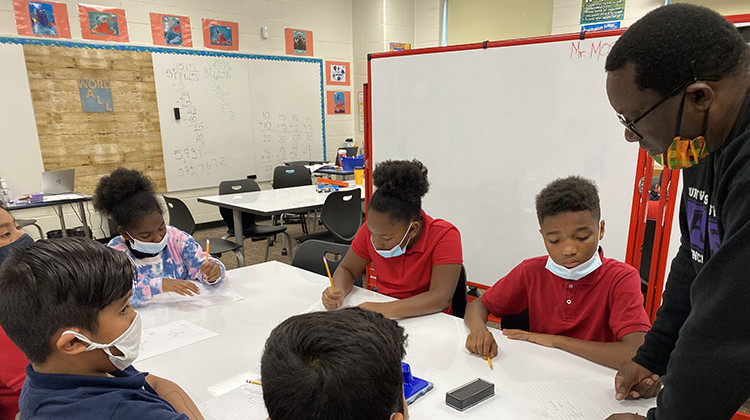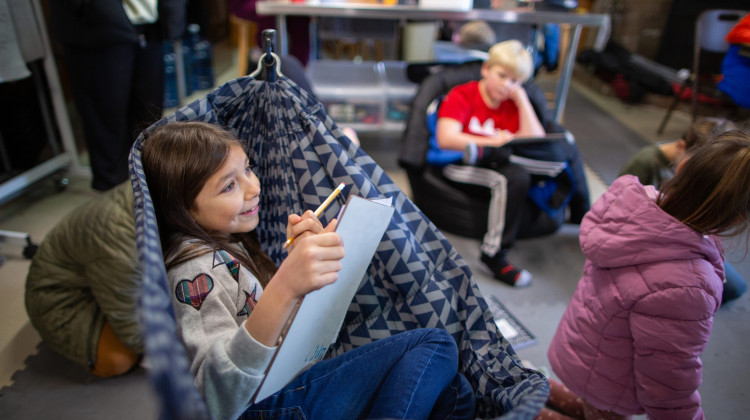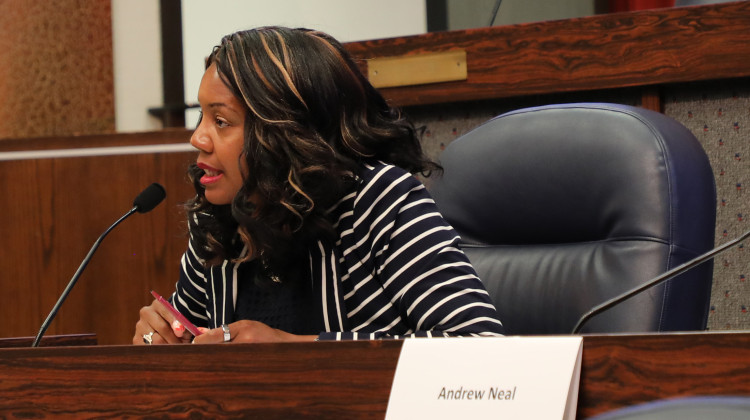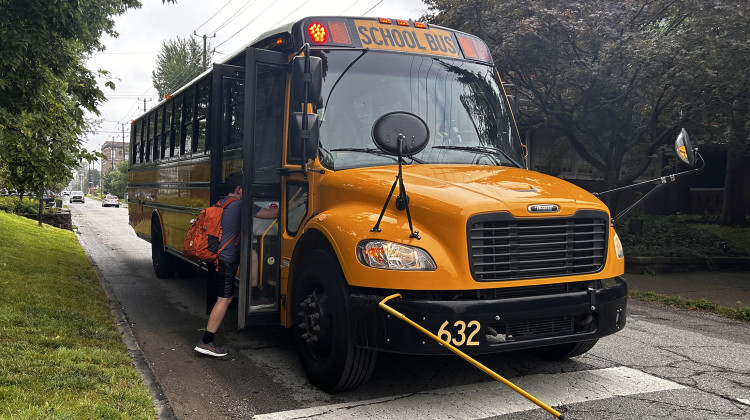
Matchbook interventionist Warner Moses helps fifth graders calculate volume.
(Elizabeth Gabriel/WFYI)Most days, the media center at Matchbook Learning at Wendell Phillips School 63 is buzzing with instructors helping students.
These particular instructors are called interventionists — they work with students in small groups to help them stay on grade level for subjects like math and reading. Matchbook, located on the near westside of Indianapolis, only has about 15 interventionists to work with roughly 650 students in grades K-8.
Retired civil engineer and Matchbook interventionist Warner Moses has taught for about five years, but this is his first semester at Matchbook. Some fifth graders are on track, Moses said, but others are on a third and fourth grade math level.
“Right now in a classroom of about 20-30 kids per classroom, teachers' jobs are … overloaded,” Moses said. “Because you’ve got various levels in the classroom. So if I’ve got kids that are at this level one, level two and level three, sometimes it’s hard.”
Students said the small group learning sessions have helped.
Fifth grader Zyiaire likes going to school so she can learn new things. Math, particularly division, has been pretty hard for her. But she’s gotten better at calculating the length, width and height of shapes.
“This stuff, like the L, W, H — that was hard to me but now I think I’ve got it,” Zyiaire said about measurements. “Because sometimes in my classroom we don’t really learn that much of stuff, but Mr. Moses helps us learn a lot of things about that.”
But the school has struggled to find sustainable funding sources to support teachers, let alone interventionists. Matchbook is one of 25 charter schools that is part of the Indianapolis Public Schools district, yet operates independently through a special contract, so it's funding streams are not the same as traditional IPS schools.
Matchbook receives less dollars per student than nearly all other IPS schools. That’s why Matchbook is one of a dozen charter schools advocating for IPS to share its referendum funding — local property-tax revenue currently unavailable directly to the charter schools. IPS leaders are considering the request and could decide on Thursday whether to allow it, but one Indiana lawmaker says doing so would violate state law.
Innovation schools struggle to provide competitive teacher pay
In November 2018, Indianapolis voters approved an eight-year, $272 million property tax referendum that would allow the district to better support teachers and students. The referendum has two parts: $52 million for capital building improvements — which any innovation charter school can benefit from if they are located inside an IPS facility — and $220 million for teacher pay raises and student services.
District leaders at the time said the new funding would not go to the independently operated charter schools.
Yet some innovation charter school parents went door to door in 2018 to help campaign for the referendum, believing it would directly benefit their schools too, such as increasing teacher pay. But their children’s schools actually haven’t directly received a portion of the operating referendum because state law says innovation charter schools like Matchbook aren’t eligible to get that funding.
Matchbook CEO Amy Swann said the lack of referendum funding has made it harder for innovation schools like hers to stay competitive.
“It becomes an issue of equity of tax dollars, really,” Swann said about local property taxes supporting students at the school. “Just because they live in an IPS boundary that IPS is turned over to an innovation school doesn't mean they should be shorted.”
Some of IPS innovation charter schools, including Matchbook, have the highest rates of students who qualify for free and reduced lunch — the national measurement for student poverty in schools.
Matchbook serves 652 students — 97 percent of students are qualify for free and reduced lunch, 48 percent of students are English language learners and 14 percent of students receive special education services. The school also has one of the highest rates of students experiencing homelessness compared to other IPS schools.
“Their parents, while maybe their property taxes aren't as much as property taxes from Broad Ripple and other places, it's still dollars that they're paying,” Swann said. “And their kids still deserve some of that referendum money to help make sure that their kids are getting an equitable education.”
IPS approved $31 million in teacher pay increases in 2019, and that was difficult for innovation charter schools to keep up with.
Last month, the district approved another 3 percent pay increase for teachers. This brings the starting salary for first year teachers to $49,100. Matchbook’s starting salary is currently $47,000. The school hasn’t determined the starting salary for next school year.
Other innovation charter schools in the district also struggle to be competitive even though they can receive the state’s Innovation Network School Grant Program that currently provides $1,000 per-student.
“I was thrilled that they gave long overdue raises to their teachers, administrators and support staff,” Scott Bess, executive director of Purdue Polytechnic High School, said. “The hard truth for us is we had to respond to that. We can't have IPS say, ‘Hey, we're going to do our starting salary at $48,000,' and us be $6,000 or $7,000 below that.”
Purdue Polytechnic High School in the Englewood neighborhood serves around 540 students. Nearly 64 percent of Purdue students are low income and about 60 percent are students of color. The school’s curriculum thrives on students collaborating and creating projects. But those opportunities don’t come without a cost.
Bess said he wants Purdue Polytechnic to receive some of the referendum funds so they can maintain teacher salaries, personalized tutors and student project supplies and equipment.
“Whatever amount comes in is going to be extraordinarily helpful in helping us defray some of those additional costs,” Bess said.
Innovation charter schools, like Matchbook, have benefited from some IPS referendum funds. They receive in-kind services such as facilities, transportation, information technology and special education services. But others, like Purdue Polytechnic, don’t receive many — if any — in-kind services.
Nearly all innovation charter schools are funded at a lower per-pupil level than traditional district schools, according to an IPS analysis.
Board members weigh potential impact on district’s budget
For about two years IPS board members have faced pressure from students, parents and education leaders to share referendum funds with charter partners like Matchbook and Purdue. The board will vote on a proposal to do so on Thursday.
If approved, each of the 25 innovation charter schools would receive $500 per in-district resident student — which would include about 10,000 students. That’s a total of roughly $5 million each year until the referendum ends in 2026. Matchbook would receive around $320,000 and Purdue would receive $212,000 in new annual funding.
But IPS schools that already receive the operating referendum funds receive $1,800 per pupil — more than three times the amount that innovation charter schools could receive.
Superintendent Aleesia Johnson says this amount would potentially allow the district to share referendum funds while maintaining the district’s fiscal health.
“What we were trying to strike the balance between is both an amount we think is meaningful and also the long term sustainability of the district,” Johnson said. “I was not going to put the district in a place where the level of sharing would cause fiscal distress and constraints across the entire family of schools direct-managed and partner charter schools as well.”
IPS would be the first school district in Indiana to share their operating property tax referendum with non-traditional schools within its district.
The district strongly recommends schools use this funding for teacher compensation and provide at least a 3 percent teacher pay raise, which would put them in line with IPS’ recent teacher compensation increases. Schools would have to provide data about how they are using these funds.
Opposition to sharing
During the IPS board of commissioners meeting on Tuesday, Commissioner Taria Slack expressed concerns about sharing the funds since the innovation schools would not be required to match the district’s 3 percent teacher pay raise.
But Johnson said requiring schools to reach this threshold could lead to long term financial instability.
“What we did not want to do is set up a fiscal cliff for anybody,” Johnson said. “Whereas you make a big commitment and then five years from now you have no way to sustain that commitment.”
Commissioner Venita Moore echoed Slack’s concerns and said she thinks the push for more funding needs to happen at the Statehouse — not at IPS.
”We can only control what we get and we didn't get what we need,” Moore said about the district's initial 2018 referendum proposal that sought more money. “But our children are failing. They're failing in all the schools within our central area. So my question is, why can't we lobby to those individuals who provide the actual funding that is needed because IPS continues to fall behind. And why do we fight like little crabs in a barrel for little pennies off the table?”
The proposal has also received public criticism.
Shortridge High Schooler Noa spoke out against referendum sharing on Tuesday, and said the district shouldn't add more strain on the district's budget.
“My school has gone through many budget cuts," Noa said. "In staff reductions, we lost our journalism teacher, an art teacher and a theater teacher. We have also lost some extracurricular activity funding that helped build our school community. Other IPS schools are also facing the same, even more severe difficulties. Sharing the referendum money would add $5 million to the IPS deficit, and making even bigger cuts which will hurt our school more.”
State Rep. Ed DeLaney (D-Indianapolis) is also opposed to the sharing proposal because he believes IPS would be violating the law if it approved the plan. That’s because the district didn’t specify how much each innovation school would receive from this funding before voters approved the referendum in 2018.
The state law that DeLaney is referencing was passed in 2020 — two years after the IPS referendum. The 2020 legislation gave public schools permission to share referendum funding with charter partners and outlined the process for doing so. The law says schools are required to say whether the referendum funding will be shared with charter schools, and if so, specify how much funding will be distributed to each charter school.
“So what we have is a public agency taking property tax funds and giving it to people who are not under their control,” DeLaney said. “And doing that without having informed the public who voted for the referendum that that was the intention. In my view, it's a slap in the face to the legislature.”
He said IPS should not vote to share the referendum, and put another referendum on the next ballot. Or he said the district could potentially face a lawsuit.
In an email response, IPS disagreed with DeLaney.
“All actions taken by the district since the passage of the 2018 operating referendum align with the question as presented to voters,” the district said in a statement. “We stand by those previous and current actions to serve all IPS students.”
Contact WFYI education reporter Elizabeth Gabriel at egabriel@wfyi.org. Follow on Twitter: @_elizabethgabs.
 DONATE
DONATE








 Support WFYI. We can't do it without you.
Support WFYI. We can't do it without you.